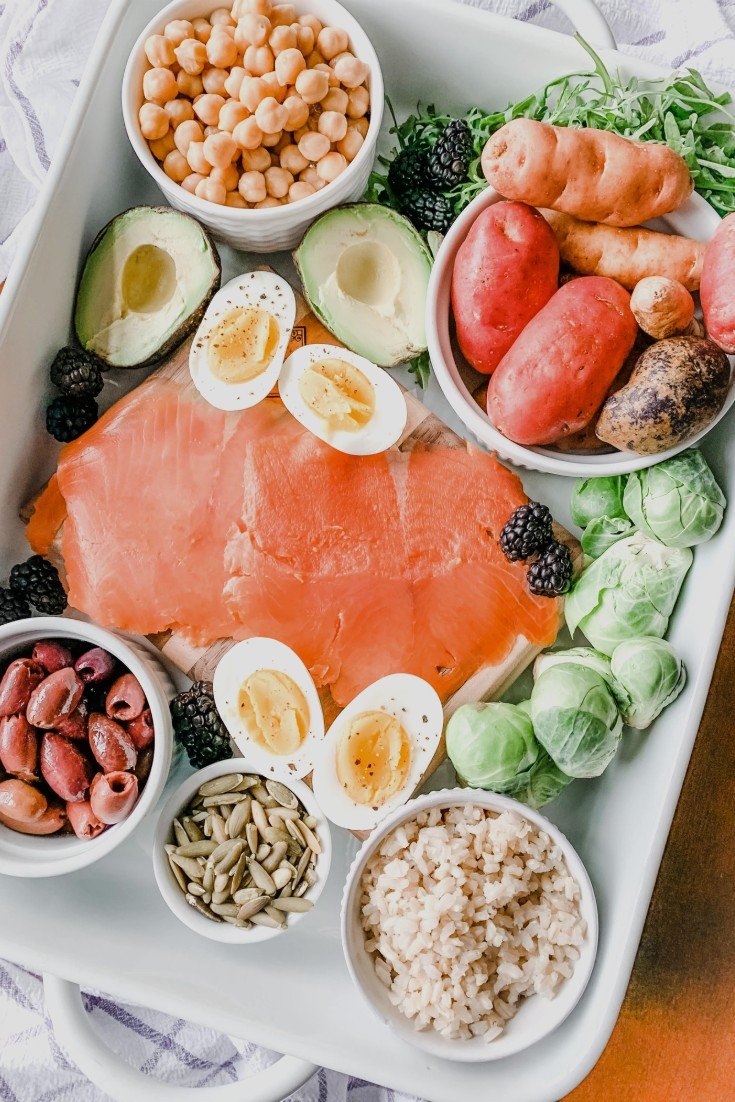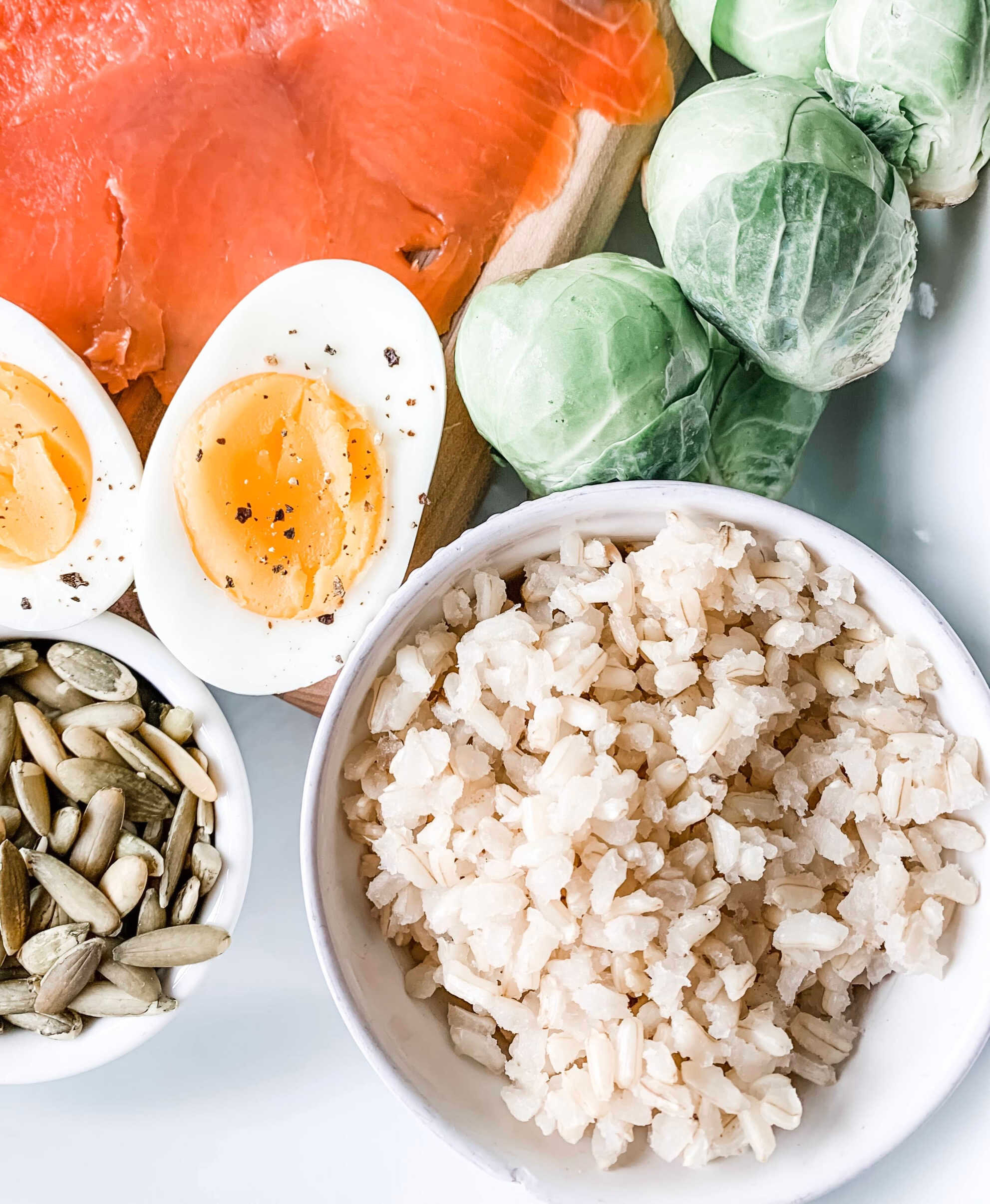Healthy Eating Habits to Feel Calm and Happy (As a Highly Sensitive Person)
Note: This post includes affiliate links and I will earn a commission if you purchase through the link. Please read my full disclosure statement here.
Level-headed.
That’s how I’m feeling during the worldwide pandemic.
And no one is more surprised than I am.
Yes, I have my moments.
But overall, I’m staying present in the moment with only brief periods of catastrophizing.
I have to wonder where I would be right now if I hadn’t been eating an anti-inflammatory Mediterranean diet to heal my gut microbiome.
I’ve watched my midnight moments of worry evaporate. And a new calm settle in.
I feel solid and mindful of how my thoughts and environment are impacting my emotions.
I share this to give you some hope if you’re struggling. And to light the way if you’re ready to get started.
Now more than ever, I’m convinced that there’s a solid connection between what you eat and your emotional life.
And science backs this up.
Food and emotional well-being
Inflammation is the silent offender that makes you feel blah on a daily basis. It can make you tired, irritable, moody and keep you from getting a good night’s sleep (Source).
If you’re injured or sick, inflammation kicks in to fight an infection. And when the bug is killed, your body stops creating inflammation.
The problem is, low-grade chronic inflammation has become the norm because our bodies are continually being bombarded by stress, little sleep and low quality food. This chronic inflammation eventually leads to pain, chronic fatigue, mood disorders, cognitive issues, autoimmune diseases and cardiovascular disease (Source).
Processed and packaged foods, simple carbs and added sugar all increase inflammation (Source). And impact the health of our gut microbes (Source).
These tiny microbes are very busy and very important.
They not only digest your food, they make anti-inflammatory fatty acids, coordinate your immune system, influence your mood, mediate your mental well-being and help to strengthen your gut barrier (Source).
Your gut barrier is essential. If you develop a gap in your gut lining, called leaky gut, food particles and toxins leak out of your gut into your bloodstream, contributing to inflammation (Source & Source).
Worry and stress, low quality foods, antibiotics, and certain medications and pain relievers all contribute to leaky gut (Source).
How does this impact your mood?
When you experience an emotion, your brain and gut communicate back and forth via the vagus nerve and signaling hormones. An imbalance in your gut from stress, inflammation or leaky gut, scrambles the messages that run between the two, causing anxiety (Source & Source).
But the solution is simple.
Start reducing inflammation by adopting the Mediterranean diet. Include prebiotic and probiotic vegetables to feed the good gut microbes. You may begin to feel better in as little as 2 weeks.
Here’s what the diet looks like.
The Mediterranean diet
Eat mostly plants. Foods grown in dirt offer a wide array of microbes. Choose organic as much as you can since pesticides trigger inflammation. Eat more asparagus, garlic, artichoke hearts, onion, radishes, jicama, and leeks. These are inulin based prebiotics that feed good microbes. Also, add in fermented veggies like sauerkraut, kimchee and other cultured vegetables, like pickles. Their live probiotics restore healthy bacteria. Don’t forget your green leafy veggies. Read this next: How to easily eat more vegetables.
Avoid processed and packaged foods. Including cereals, snacks and cookies. They are filled with additives and preservatives that alter your gut.
Replace rancid oils with anti-inflammatory Omega 3s. Keep away from trans fats and hydrogenated rancid fats. Avoid anything that has the word “hydrogenated” in the ingredients. Clean out your pantry of low quality oils like canola, corn, sunflower and safflower oils. And really, you should avoid fried food in restaurants since they reuse oil and it’s likely bad. Add in healthy sources of vegetable fat like olives and avocados. Use organic cold-pressed extra virgin olive oil in cold dressings because it easily becomes rancid when heated. Coconut and avocado oil are good for high heat cooking.
Eat lean sources of protein and less protein altogether. Reduce animal protein and animal fat consumption, which rapidly changes your gut (Source). Go for organic, free-range, as much as your budget allows. Eat condiment sized portions of meat and make one of your meals each day vegetarian. Purchase lean animal protein from poultry, minimizing fattier red meats and pork. Eat wild caught fish and Greek yogurt, if you process dairy well.
Eat whole grains and beans. Whole grains keep your gut barrier healthy (Source). Go for quinoa or brown rice or sprouted whole grain breads over refined flour-based breads and pastas. When the grain is intact, it’s more slowly digested, keeping you full longer and preventing spikes in blood sugar (Source). Soak your grains before cooking them to make them easier to digest.
Skip the sugar. Avoid sugar and especially fake sugar. Harmful gut bugs love to feast on sugar. Artificial sweeteners also create a gut imbalance. If you want something sweet, reach for high quality, 70% or higher dark chocolate (soy lecithin-free) which also relieves stress.
Think of this as a lifestyle change rather than a diet. Put your focus on adding in more vegetables and whole foods to crowd out the processed and packaged foods.
Why the Mediterranean diet and for how long?
The Mediterranean diet reduces inflammation.
Studies show that the diet improves mental well-being in as little as 10 days.
In just 10 days, the Mediterranean diet notably increased mental sharpness and contentment levels in young healthy women. A 2015 study published in the journal Nutrition showed significant improvement in contentedness, alertness and memory recall with a lot less confusion.
3 weeks of eating a Mediterranean diet leveled out mood and decreased worry and stress in young adults. A 2019 study published in the journal PLOS ONE showed that participants who made no dietary changes, sticking with higher refined carbs, processed foods and sugary foods and drinks, continued to report low mood in the “moderate severity” range.
A Mediterranean-like diet improves low mood, whereas a diet high in red meat, sugary foods, refined grains and full-fat dairy brings you down. A 2017 literature review of 21 studies showed that a diet that includes lots of fruits and veggies, fish, whole grains, olive oil, some low-fat dairy and less animal protein did much better at reducing the blues.
The power of your fork
If you feel trapped in a cycle of low mood and constant worry, it’s empowering to think that a solution may be in your refrigerator.
Start here.
Eat more fresh vegetables and whole foods and adopt a Mediterranean diet to see how you feel.
Start today.
Dear reader, please always consult with your psychiatrist or mental health professional before stopping or changing prescribed medications for low mood or chronic worry.



